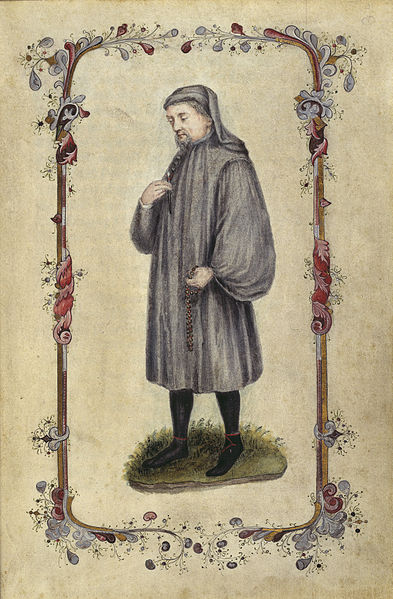Source Text:
Kökbugur, Sinan, ed. The Canterbury Tales (in Middle and Modern English. Librarius.com, 1997, is copyright protected but reproduction expressly allowed for non-profit, educational use.

“Geoffrey Chaucer (c. 1345-1400), English Poet,” 1478, by unknown artist. Wikimedia Commons.
“Chaucer’s Retraction” is the final section of The Canterbury Tales. It is written as an apology, where Geoffrey Chaucer asks for forgiveness for the vulgar and unworthy parts of this and other past works, and seeks absolution for his sins. It is not clear whether these are sincere declarations of remorse on Chaucer’s part, a continuation of the theme of penitence from the Parson’s Tale (as it appears immediately after his Tale) or simply a way to advertise the rest of his works. It is not even certain if the retraction was an integral part of the Canterbury Tales or if it was the equivalent of a death bed confession which became attached to this his most popular work (“Chaucer’s Retraction”).
Works Cited
“Chaucer’s Retraction.” Wikipedia. 22 Sept. 2020. en.wikipedia.org/wiki/Chaucer%27s_Retraction Accessed 29 Sept. 2020.
| Now preye I to hem alle that herkne this litel tretys or rede, | Now pray I to them all that listen to this little treatise or read it, | |
| that if ther be any thynge in it that liketh hem, that therof they | that if there be any thing in it that pleases them, that thereof they | |
| thanken oure lord Jhesu Crist, of whom procedeth al wit and al goodnesse. | thank our Lord Jesus Christ, from whom proceeds all wit and all goodness. | |
| And if ther be any thyng that displese hem I preye hem also that they arrette it to | And if there be any thing that displeases them, I pray them also that they blame it on | |
| the defaute of myn unkonnynge and nat to my wyl, that wolde | the fault of my lack of wit and not to my will, that would | |
| ful fayn have seyd bettre if I hadde had konnynge. For oure book seith, al that is writen is writen | have said better if I had had cunning. For our book says, “All that is written is written | |
| for our doctrine, and that is myn entente. Wherfore I biseke yow mekely, for the | for our doctrine,” and that is my intent. Wherefore I beseech you meekly, for the | |
| mercy of God, that ye preye for me that Crist have mercy on me and foryeve me my giltes; | mercy of God, that you pray for me that Christ have mercy on me and forgive me my sins; | |
| and namely of my translacions and enditynges of worldly vanitees, the whiche I revoke in my retracciouns: | and namely of my translations and compositions of worldly vanities, that which I revoke in retraction, | |
| as is the book of Troilus; the book also of Fame; the book of the XXV. | as is the book of Troilus; the book also of Fame; the book of the XXV. | |
| Ladies; the book of the Duchesse; the book of Seint Valentynes day of the Parlement of Briddes; | Ladies; the book of the Duchesse; the book of Saint Valentines day of the Parliament of Birds; | |
| the tales of Caunterbury, thilke that sownen into synne; the book of the Leoun; | the tales of Canterbury, those that tend toward sin; the book of the Lion; | |
| and many another book. If they were in my remembrance, and many a song and many a leccherous lay; | and many another book, if they were in my remembrance, and many a song and many a lecherous lyric, | |
| that Crist for his grete mercy foryeve me the synne. But of the translacion of Boece de Consolacione, | that Christ for his great mercy forgive me the sin. But of the translation of Boethius’s Consolation of Philosophy | |
| and othere bookes of legendes of seintes, and omelies and moralitee, and devocioun. | and other books of legends of saints, and homilies, and morality, and devotion, | |
| That thanke I oure lord Jhesu Crist and his blisful mooder, and alle the seintes of hevene, | that thank I our Lord Jesus Christ and his blissful Mother, and all the saints of heaven, | |
| bisekynge hem that they from hennes forth unto my lyves ende sende me grace to biwayle my giltes, | beseeching them that they from henceforth unto my life’s end send me grace to bewail my sins | |
| and to studie to the salvacioun of my soule, and graunte me grace of verray penitence, confessioun and | and to study to the salvation of my soul, and grant me grace of true penitence, confession and satisfaction | |
| satisfaccioun to doon in this present lyf, thurgh the benigne grace of hym that is kyng of kynges and | to do in this present life, through the benign grace of him that is king of kings and | |
| preest over alle preestes, that boghte us with the precious blood of his herte; | priest over all priests, that bought us with the precious blood of his heart, | |
| so that is may been oon of hem at the day of doom that shulle be saved. | so that I may be one of them at the day of doom that shall be saved. | |
| Qui cum patre et spiritu sancto vivit et regnat deus per omnia secula. Amen. | He who lives and reigns with the Father and Holy Spirit, God, world without end. Amen. |
Source Text:
Kökbugur, Sinan, ed. The Canterbury Tales (in Middle and Modern English. Librarius.com, 1997, is copyright protected but reproduction expressly allowed for non-profit, educational use.